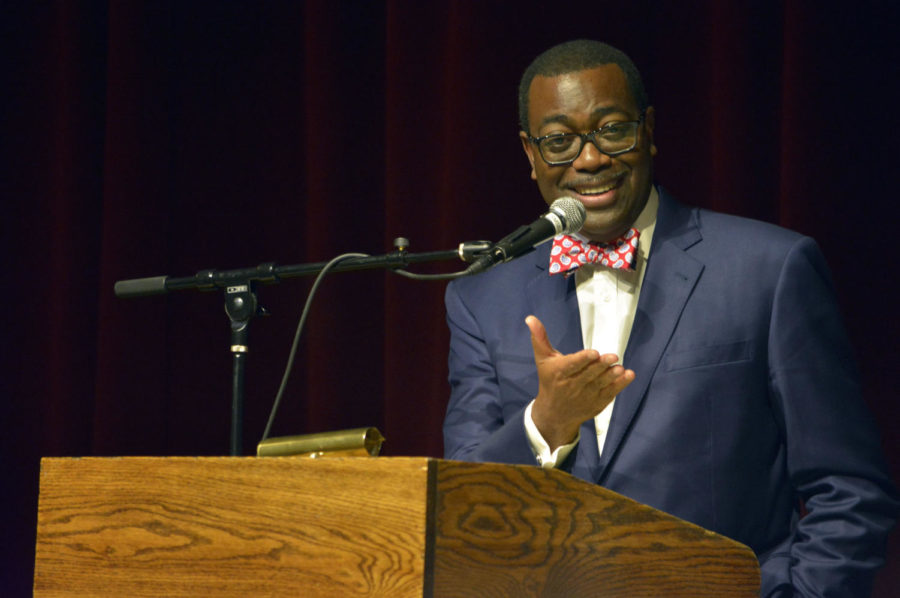Akinwumi Adesina shares vision for Africa being the key to ending hunger
Katlyn Campbell/Iowa State Daily
Akinwumi Adesina, president of the African Development Bank and Nigeria’s former Minister of Agriculture, spoke during the Norman Borlaug Lecture as the 2017 World Food Prize Laureate to a crowded Great Hall at the Memorial Union on Oct. 16. “Agriculture’s the coolest profession in the firm,” Adesina said.
October 16, 2017
To honor World Food Day, Iowa State hosted a lecture titled “The 2017 Norman Borlaug Lecture,” during which many points were made on how Africa could potentially help solve the world’s ever growing hunger problem and solve Africa’s own hunger and poverty.
The evening’s lecturer was the 2017 World Food Prize Laureate Akinwumi Adesina, president of the African Development Bank. In the last two decades Adesina has helped transform African agriculture by organizing the 2006 Africa Fertilizer Summit, has been a leader in the Alliance for a Green Revolution in Africa and has recently served as Nigeria’s Minister of Agriculture. Adesina’s policies aim to support African farmers financially, help end corruption in the fertilizer and seed sectors and promote agricultural investment across Africa.
After a welcome from Interim President Ben Allen, Adesina warmed up to the audience, thanking them for Iowa State’s hospitality. Adesina also expressed his gratitude and privilege to be at the lecture, and started by discussing how Africa holds the key to feeding those who are hungry.
“We must help Africa to rapidly modify its agriculture to reach the needs of the world,” said Adesina.
Adesina noted that Africa currently imports most of its food, something that Adesina felt strongly about.
“$35 billion importing is not acceptable. At the continued rate this is going, Africa is estimated to spend $110 billion by 2025,” Adesina said. According to Adesina, this kind of projection can be avoided due to Africa’s agricultural potential.
“Africa has huge potentials in agriculture, but as Dr. Balog said, ‘Nobody eats potential,'” Adesina said.
He later explained that Africa needs to become a worldwide provider of crops, similar to Brazil. Adesina expressed that Africa has much land that could potentially provide a faster commercialization for agriculture in Africa.
“Some argue it is too poor and fragile. Really? This is the similar soil found in Brazil, where there is high productivity, how very wrong,” Adesina said.
Something that could be a large help to Africa is the mechanization of African agriculture. The idea is that if Africa had tractors and proper modern farming technology that was properly distributed, Africa could potentially rise to be one of the largest producers of food in the world.
“New technologies will help address the problem of witches. Yes you heard me right- witches,” Adesina said. “The locals refer to the infestation of bugs and disease of crops as the witches, but with new technologies these infestations can be avoided.”
Turning Africa into an agricultural powerhouse has many roadblocks in the way, and according to the former Agriculture Minister, lack of electricity is the most devastating effect to farming in Africa.
“Africa cannot grow in the dark,” Adesina said, using an analogy for electricity’s large role many take for granted. By having the right amount of power, Africa could use the advanced technologies of agriculture and help transform African countries to a larger production of food. By changing the zones and using the agriculture technologies, he predicts that this will create markets and by extension many jobs.
“We cannot settle on just base products, It is time for Africa to move to the higher economic stage of Agriculture exports,” Adesina said. The worries that these kinds of products will not longer be popular in the near future is why Africa needs to work fast in order to push their pro-agriculture plans.
“Africa could be self-sufficient in 10 years,” Adesina said, “It has the land.”
Adesina says that the future of Africa is in the hands of the people now and Africa’s next generation of college and high school graduates who will give Africa the opportunity it needs to become an agricultural powerhouse.
“The vision can and will become a reality in our time. Ladies and gentleman, that’s what will happen and I know we can do it,” Adesina said.
The lecture’s attendees praised Adesina’s ability to connect with the audience and still deliver a very important and serious message.
“He was incredible, it was just an incredible opportunity to be an Iowa State Student,” said Alyssa Dougherty, junior in Dietetics. “It’s just great to reconnect and learn about sustainable agriculture in Africa.”
Students and adults alike generally agreed that Adesina was a good speaker and his vision for Africa’s agricultural program could succeed, admiring Adesina’s high hopes for the future and the day the world no longer deals with hunger.
















